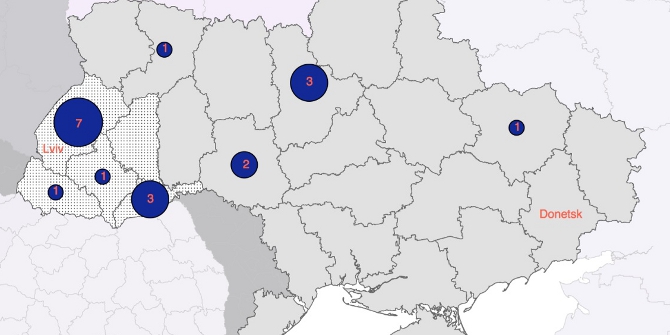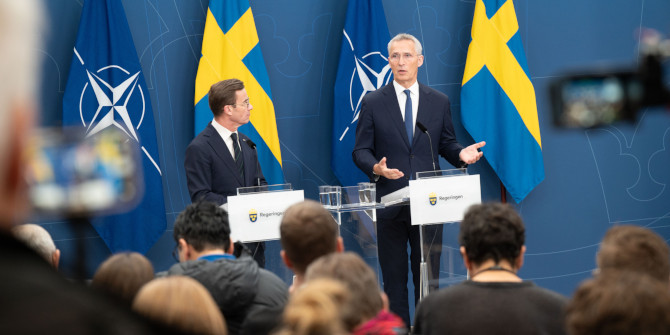

 When we consider how US military force is used, we tend to think of this in the context of operations overseas. But what does the US public think about using the military domestically? In new research, Jessica Blankshain, Lindsay Cohn and Danielle Lupton examine public attitudes towards domestic use of the military across a variety of scenarios including natural disasters, domestic terror incidents, public health emergencies and political protests. They find that that the American public are generally skeptical of using the military to intervene domestically and, depending on the incident, prefer the use of local police or National Guard forces rather than federal troops.
When we consider how US military force is used, we tend to think of this in the context of operations overseas. But what does the US public think about using the military domestically? In new research, Jessica Blankshain, Lindsay Cohn and Danielle Lupton examine public attitudes towards domestic use of the military across a variety of scenarios including natural disasters, domestic terror incidents, public health emergencies and political protests. They find that that the American public are generally skeptical of using the military to intervene domestically and, depending on the incident, prefer the use of local police or National Guard forces rather than federal troops.
Since 2020, there have been repeated calls for, and instances of, domestic intervention by various levels of the state’s military and police forces in the United States. The Posse Comitatus Act requires a constitutional or statutory basis to use the military for law enforcement purposes within the US, which include the need to enforce federal law, suppress insurrection, repel invasion, or aid states at their request. The National Guard—which is not subject to these restrictions when operating under state control, but can also be brought under federal control—has been called upon to for tasks ranging from staffing covid testing sites and hospitals to responding to political protests. Earlier this year, there were renewed calls for interventions on college campuses in response to protests opposing Israel’s operations in Gaza, with responses primarily coming from state and local police. While researchers have considered US public attitudes toward the use of the US military overseas (finding that the public prefers operations that are likely to succeed, are seen as legitimate, and that minimize US casualties), less is known about the public’s attitude toward the domestic use of the military. In new research, we find that the public is generally skeptical of using the military to intervene domestically, favoring limited intervention in most cases.
What does the public think about how the government responds to a domestic incident?
In a 2020 survey experiment using a Qualtrics panel of about 1200 participants across the United States—selected to be reflective of the US population on key demographics—we asked respondents to consider a series of vignettes about “a government response to a domestic incident.” Our hypothetical interventions were informed by recent real-world domestic interventions. Across our vignettes we varied four key attributes; the first was the type of domestic incident: “a Category-5 Hurricane”, “a Black Lives Matter (BLM) protest”, “a Reopen America protest”, “a threat of multiple car bombs to be detonated by a terrorist organization”, and “an outbreak of a highly contagious and deadly disease”. The second key attribute was the responding force: “the police,” “state-controlled National Guard personnel”, “the military”, and “active-duty military personnel”. We further varied whether the response mission was to “provide transportation and distribute supplies” or “maintain order”, and whether the actors were armed or unarmed.
We then prompted respondents to assess the intervention in a number of ways. The outcomes we were most interested in were approval of the intervention and perceptions of its legitimacy and effectiveness. We measured each in multiple constructs to improve reliability and validity. In addition to these outcomes of interest, we asked participants questions designed to determine their views on government and civil liberties generally, as well as a standard group of ideological and demographic questions.

Photo by Ian Hutchinson on Unsplash
The public prefer less militarized responses to some domestic incidents
Overall, we found that respondents preferred the use of local police or state-controlled National Guard forces rather than federal troops. They also preferred the use of unarmed actors over armed ones, and deployments intended to provide logistical support rather than maintain law and order. These preferences, however, depended on the initiating event. Subjects preferred more militarized intervention only in the case of a suspected terrorist threat and were less supportive of the use of federal forces (as opposed to local police or National Guard) in response to political protests. Yet, respondents were less likely to object to an armed or order-maintenance response to a Black Lives Matter (BLM) protest than to other forms of political protest.
Figure 1 – Public approval by intervention event

Note: Dots represent OLS estimates with 95% confidence intervals. Coefficients reflect the change in approval for each attribute relative to the baseline category. Baseline categories are depicted as dots without confidence intervals. Full regression table available in the appendix.
Public support for domestic interventions differs more by party than by race
Perhaps unsurprisingly in the current political climate, we also found partisan differences in responses. Subjects who identified as Republicans were more supportive of interventions in response to political protests, order maintenance interventions, and armed interventions. Less intuitively, we found little evidence of systematically different preferences between white respondents and either Black respondents or all respondents of color.
Our study is an important caution to those who are eager to use the National Guard and especially active-duty forces in response to domestic disturbances, especially political protests. Although the public has higher confidence in the military than in the police, they are leery of using the military for domestic policing, and they are generally uncomfortable with militarized responses to what is essentially civil disorder.
- This article is based on the paper ‘I’m from the Government, and I’m Here to Help: Public Perceptions of Coercive State Power’, in American Political Science Review.
- Please read our comments policy before commenting.
- Note: This article gives the views of the authors and does not represent the official views or positions of their employers, nor the position of USAPP – American Politics and Policy, nor the London School of Economics.
- Shortened URL for this post: https://wp.me/p3I2YF-e3B






